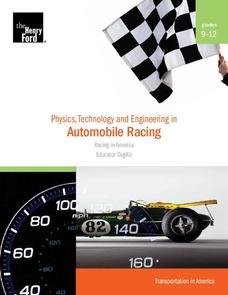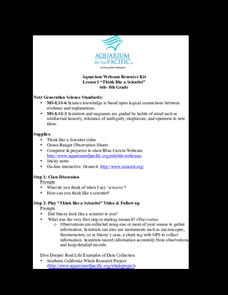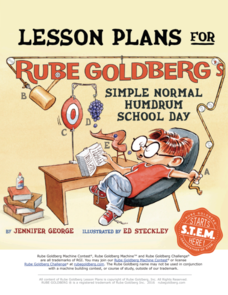Curated OER
Koi Pond
Create this beautiful koi pond scene using watercolor paper, crayons, and paints. This would be a fantastic project to link to a scientific study of pond life or a historical study of Japanese culture.
Henry Ford Museum
Physics, Technology and Engineering in Automobile Racing
Start your engines! This five-lesson unit introduces physics and Newton's laws through automobile racing. Each lesson includes background information, a student worksheet, and an answer key. There are also culminating...
NOAA
History's Thermometers
How is sea coral like a thermometer? Part three of a six-part series from NOAA describes how oceanographers can use coral growth to estimate water temperature over time. Life science pupils manipulate data to determine the age of corals...
Aquarium of the Pacific
Think Like a Scientist
Scholars watch a video and meet a scientist who is studying sharks as she explains her observations about the sharks and provides her hypothesis to explain their behavior. Learners then act like a scientist as they watch an aquarium...
Curated OER
DNA Detectives
In order to understand DNA fingerprinting, advanced biology aces divise a crime scenario and analyze three different samples of lambda DNA. This creative lesson plan provides practice with micropipettes, electrophoresis boxes, and other...
Curated OER
Dirt Babies
Dirt babies are an excellent way to show young botanists the plant life cycle. They explore the functions and industry behind grasses before growing some of their own. Use the informational text here and consider implementing some...
Berkeley Engineering and Mentors
Marshmallow Catapaults
After a brief lecture on levers, torque, projectiles, and the five-step engineering design cycle, young physical science learners or engineers build catapults out of craft sticks. This is an open-ended exploration of what works and what...
PBS
Lesson Plan: “Seeing the Way: A Brief History of Cataract Surgery”
After looking at the history of cataract surgery techniques, your high schoolers will have a new perspective on medical and scientific advances. Kids alternate between watching short video clips, class discussion, and computer research....
Polytechnic Institute of NYU
Potential vs. Kinetic Energy
Legos in science class? Watch your pupils fall in love with this activity. After learning to measure potential and kinetic energy, young scientists create their own ramps using Lego Mindstorm sensors and software.
Curated OER
Genome: The Secret of How Life Works
What do you have in common with a fruit fly? About 60 percent of your DNA. The resource, divided into two units, is intended for grades four to eight and another for high schoolers. Both units include eight lessons covering the...
Association of Fish and Wildlife Agencies
Schoolyard Biodiversity Investigation Educator Guide
In 1980, in the tropical rainforests of Panama, scientists discovered 1,200 species of beetles living in and around just 19 trees, with most of the species new to science—that's biodiversity! In the activity, learners work in teams to...
Kenan Fellows
Sustainability: Learning for a Lifetime – The Importance of Water
Water is essential for life—and understanding the importance of clean drinking water is essential in understanding sustainability! Show your environmental science class the basics of water testing and treatment through a week-long...
Google
Teacher Appreciation
Show your teacher you care. Young scholars use the Blockly programming language to create a card for their teachers. Using variables, encapsulation, objects, and sequences helps advance their computer science knowledge at the same time.
Google
Mary Poppins Returns
Make Mary Poppins proud. Young computer scientists use block-based coding to create snowflake animations with a Mary Poppins theme. They learn how to apply sequences, actions, and loops in computer science.
Rube Goldberg
Rube Goldberg's Simple Normal Humdrum School Day
If you're going to build a machine, you might as well make it interesting and amusing. A set of eight lessons and activities introduces simple machines using Rube Goldberg machines. A culminating project challenges techies to create and...
Curated OER
Stained Glass Flowers
Elementary and middle schoolers create decorative flowers using wire armatures and a special paint that remains flexible when it dries. The results from this project are stunning, but the materials needed may be tough to track down. An...
NOAA
Where There's Smoke, There's ...
A remotely operated vehicle approaching a volcano was engulfed by molten sulfur where the plumes of fluids contained the highest concentrations of aluminum ever recorded. This isn't science fiction or an April fools joke, though it did...
Midnight Martian
Mars Globe HD
Explore the surface of Mars without leaving the comforts of your home or classroom! Learn about volcanoes, missions to the red planet, view the topography, and more.
Curated OER
Bering Sea Buffet - A Foodweb Activity
Life in the Bering Sea, food webs, and the ocean ecosystem are introduced with a map activity. The instructional activity starts as kids explore maps and images of the Bering Sea, then it kicks into high gear as they start to discuss the...
New York State Department of Environmental Conservation
Adaptations – Designs for Survival
What's the difference between behavioral adaptations and physical adaptations? Learn about the various ways that organisms adapt to their environment with a worksheet about the creatures of the Hudson River.
National Wildlife Federation
It's a Green Revolution: An Introduction to Eco-Schools USA
Eco-schools is a project of the National Wildlife Federation and empowers schools to manage their schools with a green focus. Scholars work to define environment and sustainability and springboard this into learning the eight...
Philadelphia Museum of Art
Physics at the Art Museum: Kinetic Energy, Potential Energy, and Work
Connect science, math, and art for a true interdisciplinary lesson! Learners explore simple machines in art. Through analysis with a physics app, they identify positions of kinetic and potential energy and make conclusions about work.
K20 LEARN
Rules Of The Mogwai: Lab Safety And Chemical Properties
When you don't follow the rules, bad things can happen! Kick off your next lab safety lesson using a resource from the K20 Center. Pupils partner up to decipher MSDS for common lab chemicals, brainstorm common safety rules and their...
Howard Hughes Medical Institute
Understanding Variation
Does where we live influence how our bodies express genetic traits? Explore variation in human skin color with an activity that incorporate video and hands-on learning. Individuals model the relationship between phenotypes and genotypes,...
Other popular searches
- 4th Grade Science Project
- Physical Science Projects
- Science Project on Pulleys
- Science Project Volcano
- Science Project Gravity
- Science Project Ideas
- Forensic Science Project
- Science Fair Project Ideas
- Rock Science Project
- Science Project Food
- Science Project Terrarium
- Science Fair Project Data























